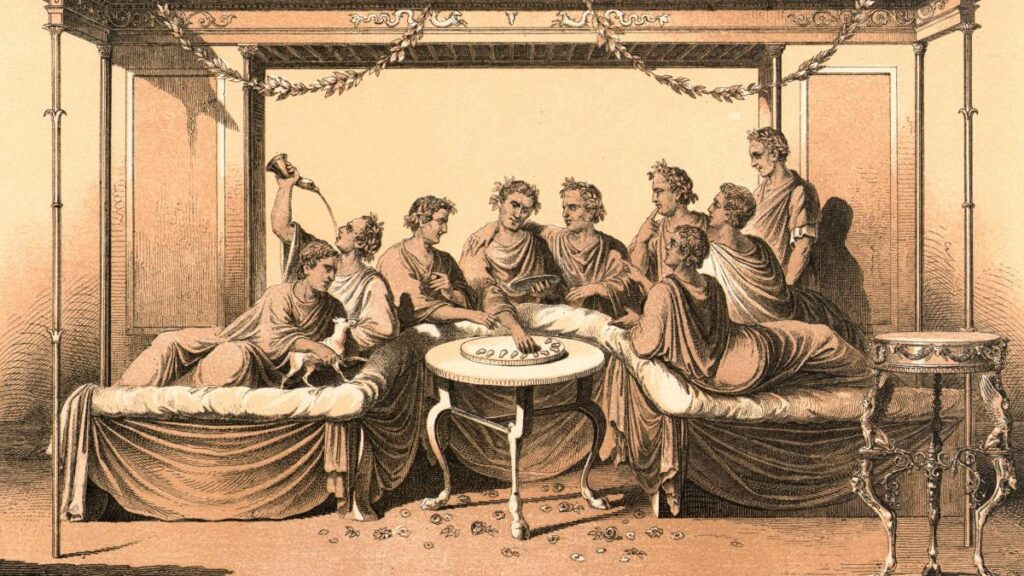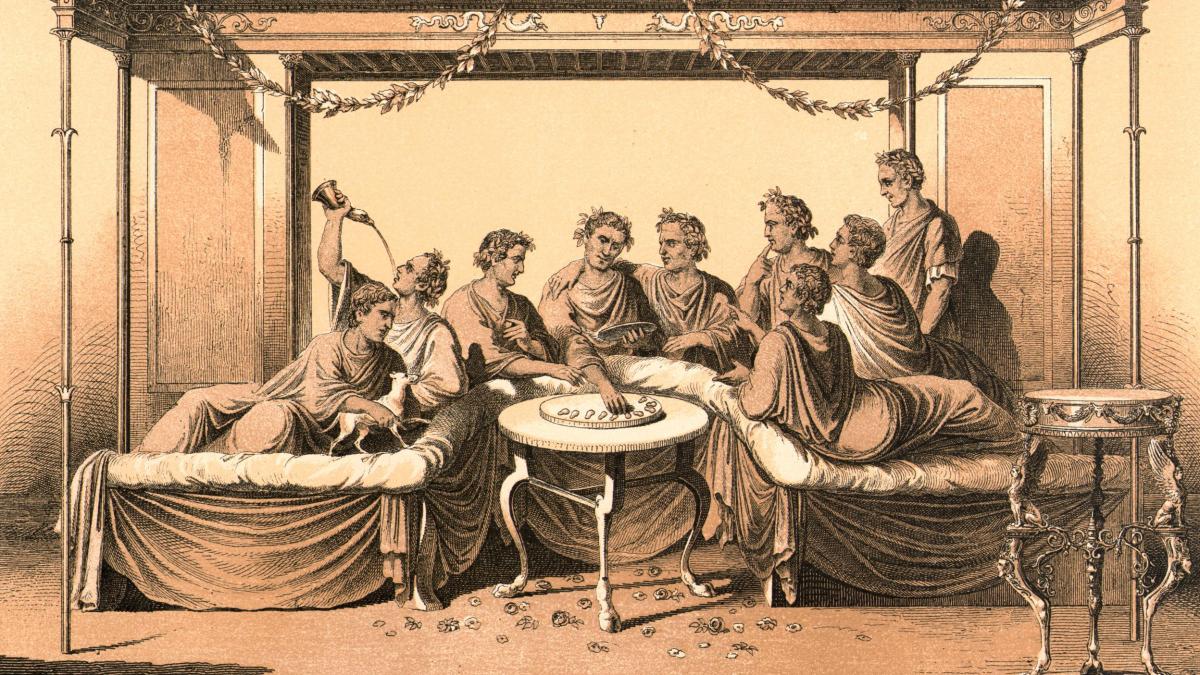In general, a set of dialogues called “Symposium” is a story about a group of virtuous friends who get into hilarious situations and make vulgar jokes about each other. Behind the jokes, there is sometimes an irony that points to the virtue of each character. But besides the banal self-glorification of Socrates’ friends, we are interested in the following points. Socrates here is against people using perfumes (as elsewhere in Xenophontes he was against the use of spices for food, cosmetics for women, decorating the home, etc. cf. “Domostroi”). But this in itself would not be interesting if he did not add that the natural odor of people is better, and that it differs from person to person to such an extent that one can distinguish a person’s occupation and origin by smell.
— So, perhaps, this is true for the young; but for us, who are no longer engaged in gymnastic exercises, what should we smell?
— Virtue, by Zeus,” replied Socrates.
To smell virtue is indeed something new. While explaining to us where to find a “perfumer”, Socrates quotes the most “fascist” and conserative-reactionary poet of the past generations, an admirer of aristocrats, Theognides:
From the noble you will learn goodness; but if with the bad.
Thou wilt lose thy former wit.
In addition, it is interesting that Xenophontes paints the founder of the school of the Cynics, Antisthenes, as the most resentful and angry student of Socrates. And, at the same time, the most serious, who promotes the theses of Kinism even in such a humorous setting that it looks quite ridiculous. He even confesses his love to Socrates, almost without irony, and the latter ignores him on purpose. Offended, he pokes fun at the teacher. Including on the subject of “bringing up women”, saying that Socrates teaches everyone this art, but his wife is grumpy. Socrates replies that:
And people who want to become good riders, as I see, take not the most humble horses, but hot ones: they think that if they can tame them, they can easily cope with all of them.
The analogies are bombastic, “a wife is like a horse to be ridden”. No less vivid are the examples with dancers, admiring whom Socrates himself wanted to become a dancer. His friends laughed at him, saying that it is not a serious matter for a “real man”, but Socrates insists that in principle dancing is not a bad thing and useful for health, so Socrates’ friends bend in this matter, although they still do not want to dance, because it is shameful. Compared to Plutarch, who condemned and ridiculed dancing without any “buts”, here Xenophontus also does not look like such a rigid conservative as we are used to seeing him.

In Xenophontes, the character of Socrates even appreciates the beauty of bodies, without censuring it as debauchery, and takes part in all elements of the feast as a very ordinary citizen (in the book “Memories of Socrates” there are even more such “controversial” moments, where Socrates is not a caricature Jesus, but a living person). He makes really ironic jokes, instead of that pseudo-irony in the spirit of “you are all so smart, and I am so stupid”, which we see in Plato. This character is much deeper, and more like a real character than the caricatured Socrates of Plato’s dialogues.
— What is this? — Socrates said. — Are you bragging like this, thinking yourself more handsome than even me?
— ‘Yes, by Zeus,’ answered Critobulus, ‘or I would be uglier than all the Silenus in the Satyr dramas.
His pupils can afford various invectives, from which Socrates has to refuse or joke: “But why, Socrates, do you scare us, your friends, away from handsome men, while you yourself, by Apollo, as I once saw, leaned your head against Critobulus’ head and your naked shoulder against his naked shoulder, when you both were looking for something in the same book at the schoolmaster’s?”. But still, even with all the atypical frivolities that make Xenophon more “liberal” than Plato, his writings are full of the fattest conservatism. His heroes literally memorize Homer by heart, condemn the bourgeois way of life in general, ridicule sophists, adore aristocracy and directly push carts with approval of slavery, racism, etc. This is what Xenophontus is good for, that he combines contradictory traits.
Characters of the work, political-ideological context
This is as far as the ideological content is concerned. But other, indirect parameters, i.e. the historical characters used here, are no less important. First of all, the figure of the organizer of the feast is important — it is Callius, the richest man in Greece. The attitude of Socrates’ circle to the “richest” is a well-known thing, so Callius acts as a clown in “Symposium”. Everyone makes fun of him, giving him praise, which he does not deserve, and he does not realize. It was said that he liked to host famous sophists and spent a lot of money on them, wishing to borrow wisdom from them and to be known as a scholar. This theme is played out in the “Pyre”. For example, when Callius invited Socrates to a feast, a dialog immediately broke out between them:
Socrates: All you mock and despise us, because you gave a lot of money to Protagoras to learn wisdom from him, and Gorgias, and Prodicus, and many others; and you look at us as self-taught in philosophy.
— ‘Yes,’ answered Callius, ‘I have before concealed from you that I could say many clever things, but now, if I have you, I will show you that I deserve your full attention.
Needless to say, he could learn nothing good from the sophists, except that one should despise Socrates’ party. This theme is repeated once more in the middle of the text, when Socrates proves that Antisthenes-kinicus was an excellent panderer, he says:
I know that you drew our Callius to the wise Prodicus, seeing that Callius was in love with philosophy, and Prodicus needed money; I know that you drew him to Hippias of Elida, from whom he had learned the art of remembering, and from then on he became even more in love, because he never forgets anything beautiful that he sees.
Niceratus, the chief companion of Callius, is no better. He is the son of the famous commander Nicius (a moderate democrat), a lover of Homer, who knew his poems by heart. He was executed during the reign of the “Thirty Tyrants” in 404. At the same time was executed and Autolycus, the lover of Callius, in whose honor he and arranged a feast. But Lycon, Autolycus’ father and an impoverished aristocrat, who is also present at the feast, survived the tyranny, and later, with Meletus and Anitus, was Socrates’ prosecutor in his trial. This is the democratic part of the party, most of whom suffered at the hands of Socrates’ disciple, Critias, during his tyranny.
But the future murderers of the democrats were also present at this feast. Harmidus was a relative of Plato and Critias, and an accomplice to tyranny. Originally he was rich, but at the time described, as a result of the devastation of Attica by the Spartans at the beginning of the Peloponnesian War, he lost his fortune (nevertheless, he was not offended by the Spartans, he took it with understanding). He was close to Socrates, who persuaded him to take part in public affairs. He was killed in a battle with the democrats in 403, in the process of overthrowing tyranny. Socrates’ friends Hermogenes and Critobulus are also present.
Hermogenes was the half-brother of Callius, but unlike him he was poor and joined Socrates. In some sources, he is considered a disciple of Parmenides and a teacher of Plato (i.e. a link). Xenophontes’ book with reminiscences about Socrates was written according to Hermogenes’ testimonies. He was engaged in politics and after the execution of Socrates and the return of democracy. Critobulus is the son of Criton, one of Socrates’ best friends. In the dialogues he is portrayed as a man very handsome and proud of his beauty, inclined to hedonism. According to other students of Socrates, he led a bad way of life and learned nothing from Socrates (thus Socrates brought up dubious personalities not only in the person of Critias and Alkibiades, but also at least Critobulus, Aristippus and Antisthenes). However, his father, after Socrates’ death, suddenly disappeared from all radars and stopped practicing philosophy.
So all these people, in the future enemies of each other, at this time could still communicate in a close circle. These are important moments for us, because they help us to understand both the trial of Socrates and the political views of his circle.

Добавить комментарий